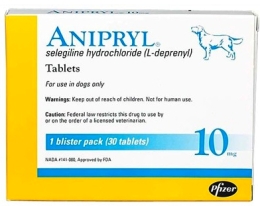I 'm having a problem with Rigby, a 12-year-old male Lab mix diagnosed with pituitary-dependent Cushing's disease 3 years ago. We started him on trilostane (Vetoryl) at that time and the dog has done well, with complete resolution of clinical signs of polyuria and hair loss.
'm having a problem with Rigby, a 12-year-old male Lab mix diagnosed with pituitary-dependent Cushing's disease 3 years ago. We started him on trilostane (Vetoryl) at that time and the dog has done well, with complete resolution of clinical signs of polyuria and hair loss.
The owner called today and said that Rigby has been having urinary and defecation accidents in the house for 3 weeks. He has also been pacing, and possibly circling much of the night.
It sounds to me like the dog could be suffering from canine cognitive dysfunction. Can I use selegiline for canine cognitive dysfunction when the dog is already on treatment with trilostane? I was wondering, of course, because at one point in time selegilene was commonly used to treat Cushing's disease.
My plan is to first work the dog up to rule out an urinary tract infection, but do you have any other thoughts about the pacing and circling?
My Response:
First of all, your idea to do a workup for urinary tract infection (complete urinalysis with culture) is a good one and that should be the first step in your diagnostic testing. Urinary tract infections are common in dogs with Cushing's disease, even on treatment. If you haven't recently monitored the effects of trilostane treatment with an ACTH stimulation test, that should also be done at this time.
 If you believe that Rigby has canine cognitive dysfunction, you can certainly use the drug selegiline hydrochloride, also known as L-deprenyl (veterinary trade name, Anipryl) along with the trilostane that the dog's already getting.
If you believe that Rigby has canine cognitive dysfunction, you can certainly use the drug selegiline hydrochloride, also known as L-deprenyl (veterinary trade name, Anipryl) along with the trilostane that the dog's already getting.
As you know, Anipryl is approved by the FDA for use in dogs for treatment of pituitary-dependent hyperadrenocorticism, as well as canine cognitive dysfunction. This drug has fallen out of favor for treating dog's with Cushing's syndrome because it only partially controlled the disease in most dogs.
For cognitive dysfunction, some owners have reported marked improvement changes in their geriatric dog's behavior after starting Anipryl, while other dogs may not respond at all. Because of the drug's low incidence of side effects, however, it's certainly worth a try in dogs with suspected cognitive dysfunction.
I'd also recommend a good neurological exam. Remember that this dog has pituitary-dependent Cushing's disease. In most of these dogs, the cause have a pituitary ACTH-secreting tumor. With time, these pituitary tumors can grow and become large macrotumors, expanding and compressing the hypothalamus. That of course could be the cause of the dog's pacing as well. If that is suspected, a CT or MRI is recommended to confirm the presence of a large pituitary mass.
Źródło: endocrinevet.blogspot.com
© 2024 © Vetco 2015. Wdrożenie: Pracownia Synergii










